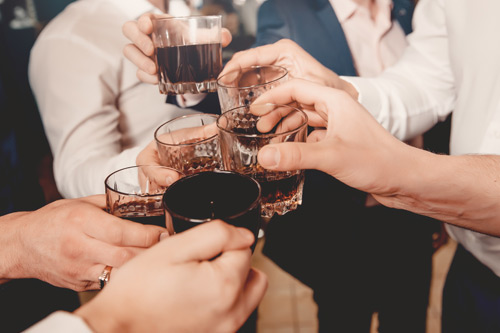Sexual Harassment Risks During Office Holiday Parties
The Holiday office party has long been thought of as a welcome and necessary pressure valve for overworked employees to cut loose and have some fun; and as a way for employers to say a special ‘thank you’ to their valuable workers. However, these parties have also been synonymous with copious alcohol consumption, and sometimes with unprofessional or downright bad behavior.  Although employers are increasingly recognizing the risky environment created by a booze-fueled office romp and instituting changes to how these parties are run, reports continue to proliferate about sexual harassment in the workplace—including at employer-sponsored events.
Although employers are increasingly recognizing the risky environment created by a booze-fueled office romp and instituting changes to how these parties are run, reports continue to proliferate about sexual harassment in the workplace—including at employer-sponsored events.
Sexual harassment at office parties is very common
Although the image of the drunken buffoon making a fool of themselves at an office holiday party is a fixture in American media, most people don’t realize just how ubiquitous problematic behavior at these events actually is. A 2010 survey conducted by Adecco found that 40% of respondents had either engaged in inappropriate behavior at an office event, or knew someone who had; 23% had been personally reprimanded or knew someone who had been reprimanded for this behavior, and 11% reported that either they or someone they knew had been terminated as a result. With the #metoo movement shedding light on the banality and destructiveness of everyday sexual harassment for all women, more and more employers and employees are recognizing that formerly tacitly acceptable behaviors are absolutely unacceptable, and are adjusting their policies accordingly.
Changing perspectives on office holiday parties
More than anything, alcohol is blamed for creating a libertine atmosphere that encourages sexual harassment, and many employers have decided that alcohol has no place at a work-sponsored event. A poll by the placement firm Challenger, Gray & Christmas found last year that 11% of surveyed employers elected not to have a holiday party. Of those that did host a party, only 49% planned to serve alcohol—down from 62% the previous year. While these changes are driven in some part by changing office culture more broadly, decreasing incidents of sexual harassment is almost certainly a motivating factor.
Examples of sexual harassment
Sexual harassment at a holiday party can take many forms. Some examples of legally-sanctionable behavior include:
- Giving or receiving an inappropriate or sexually suggestive gift
- Making inappropriate or sexual remarks
- Unsolicited touching, for example forced kissing, hugging, or groping
- Commenting on a co-worker’s body
- Propositioning a co-worker
How to avoid sexual harassment risks at holiday office parties
Do not drink to excess, or avoid alcohol entirely if possible. Alcohol is one of the most dangerous contributors to sexual harassment and abuse. It works by lowering inhibitions and, in some cases, leading to intoxication, which are both risks for victimization.
Hold yourself and your co-workers to the same standards that you would during a regular business day. Just because the office party is a chance to let loose does not mean it is a free-for-all, and that your co-workers magically transform into your drinking buddies. The same boundaries that apply on a Tuesday morning should also apply at the office holiday party.
If anybody makes you at all uncomfortable, report the incident to management or HR. Even if the incident seems benign, trust your gut—if your co-worker was being “creepy” or made you feel weird at all, this behavior is unacceptable and may escalate if they do not face reprimand or sanction.
Contact a Sexual Harassment Lawyer
If your incident report is insufficiently addressed by your employer, consider consulting with an office party sexual harassment attorney. You may be entitled to compensation or other redress under existing anti-discrimination law. The Dominguez Firm has considerable experience providing consultation and legal representation for employee victims of sexual harassment all over the Greater Los Angeles area. Call today for a free consultation about your case at 800-818-1818.
